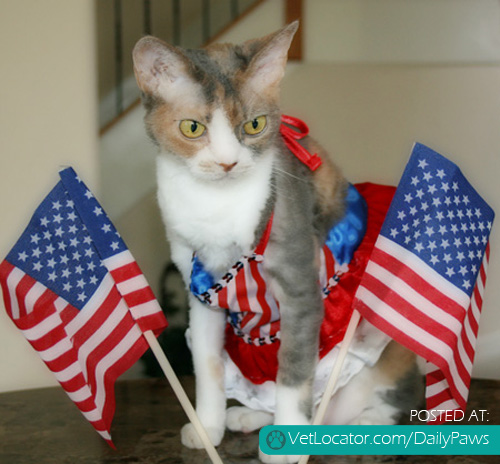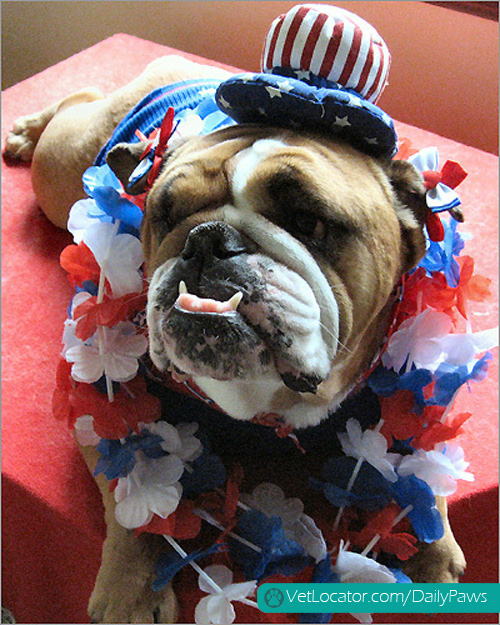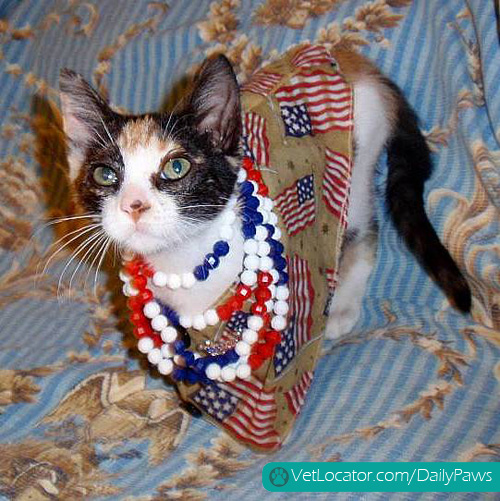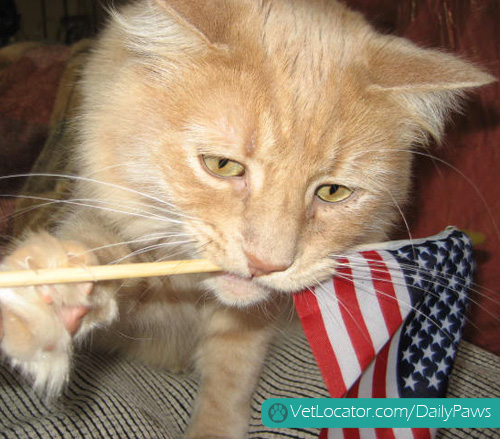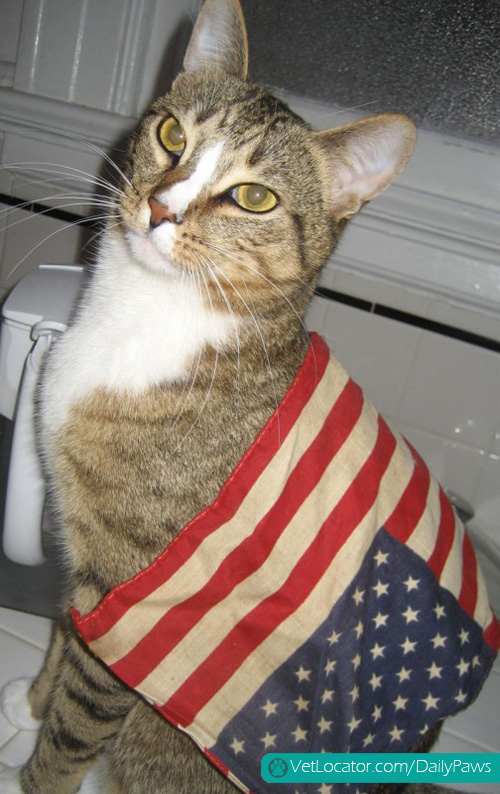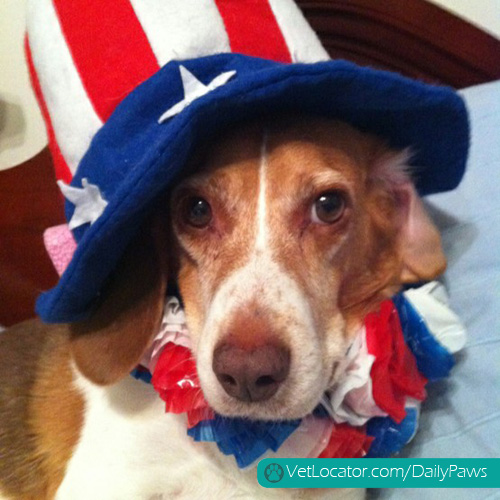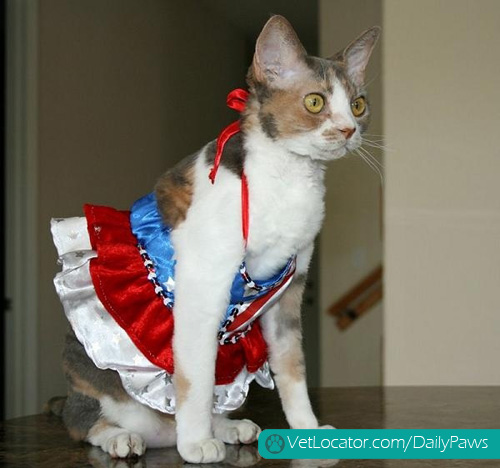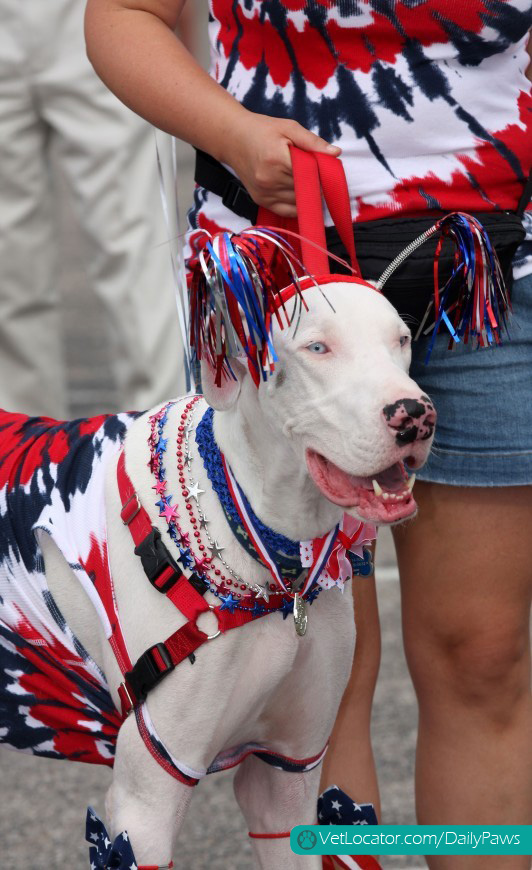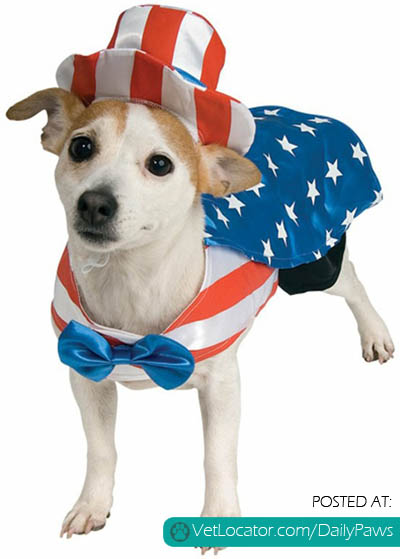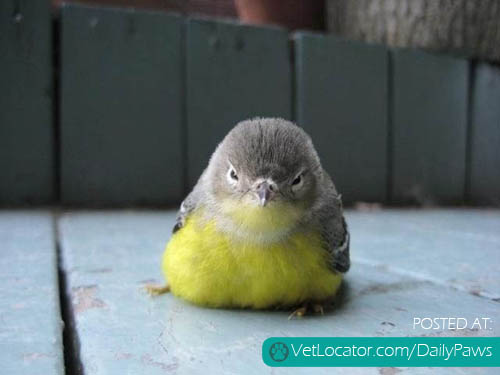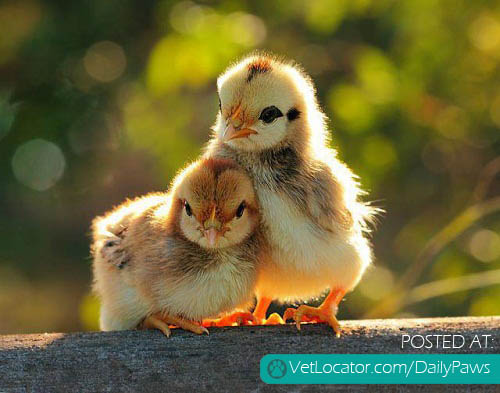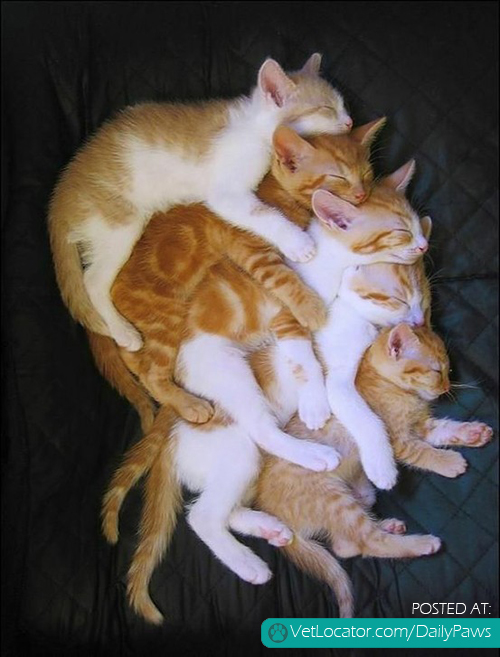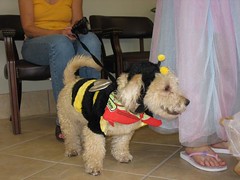Patriotic Pets – Happy 4th of July!
July 3rd, 2012Petiquette & pet safety tips for the 4th of July
July 3rd, 2012 Today is going to be a great evening of bar-b-ques, fireworks and get-togethers.
Today is going to be a great evening of bar-b-ques, fireworks and get-togethers.
We hope you and your friends and family have a wonderful time, but want to remind you to make sure your pets are safely tucked away before all the noise begins.
In the event that you and your pets are able to accept holiday invites together too we thought we’d share some petiquette tips you might find handy.
1. The very first thing you’ll want to do is to make sure it’s ok with your host that you bring your pet with you.
2. Next make sure he/she has a collar with an ID and that the ID has correct information on it. These days it’s an excellent idea to use a cell number rather than a home phone number since your cell phone is usually with you and you can be reached quickly in an emergency.
3. Put your vet’s phone number and an emergency vet hospital number into your cell phone to have it handy in the event you need it.
4. Try to find out who’ll be at the party in case you need to make plan changes (for example people with babies, small kids or other pets can change things, including whether you should bring your pet with you).
5. Bring along pet essentials like food and water bowls, a leash, handy wipes and cleaning stuff and pet waste bags.
6. I like to bring some special treats with me. Folks like to feed my dog, so I give them some of his healthy treats to make sure he’s not getting junk.
7. Pets can make a mess sometimes so I keep a couple of baggies handy for the expected and unexpected messes and also have a lint roller in my pet kit because my dog has been known to shed.
8. It’s not a bad idea to have a crate handy so your pet can be safely secure if things get crazy.
9. If you notice your pet becoming tired or agitated, secure him in a closed room or his crate if you aren’t able to take him home.
10. Don’t let pets wander around cooking food. Not only can it be a problem for the cook, but your pet might accidentally eat something that’s not good for him.
11. Always be aware of where your pet is during any event. Pets can become nervous and bolt in unfamiliar surroundings. Also, like children, there are times when they’ve had enough and it’s time to go home.
Now for some personal peeves I’ve experienced attending events where certain pets should not be. I’m titling this short list ****If your dog has any of the following problems, please leave him/her at home.
1. Incessantly barks at other people, dogs, birds, cats, etc. A barking dog that won’t quiet is distracting and the owners that won’t remove the dog are just plain rude.
2. An aggressive animal. If you know your dog – or cat – is aggressive, LEAVE THEM AT HOME. Period.
3. Your pet is ill or has not been feeling well. Besides the obvious point of an ill pet might be a contagious pet, outings can be stressful and can make your pet’s health worse. Leave an ill pet at home with a sitter and not in a kennel.
4. The event will have people who are fearful or allergic to pets – See #1 above.
5. Your pet is having a bad day – everyone does and our pets are no exception. If you see that your pet is having a bad day, give him/her a break and let them stay home.
If you decide to leave your pet at home while you attend a party or other event, consider the best options for him while you’re gone.
- If he’s not used to being home alone, you should leave for short periods of time to prepare him/her to being by themselves.
- If you’ll be gone for any length of time you may want to consider keeping your pet at a kennel. This is a good option for social animals that don’t stress about being away from home.
- Additionally, for animals that are going to a kennel and may not be used to small spaces, consider getting a crate ahead of time to prepare the pet.
- Arrange play dates for pets who might not be used to having other animals around. Send along an item that smells like home for a pet’s stay at the kennel.
- Kennel spots should be reserved early for the holidays. If you’ve not used a particular kennel before, check into their safety measures, such as video surveillance, fire alarms and sprinkler systems.
- Make sure your pets are up-to-date on their vaccines, and find out if any others are required for their kennel stay as most kennels will request proof before allowing your pet to stay.
Pet sitters are a good option for animals that do better at home or if you have several pets that you’ll be leaving. If you decide to hire a pet sitter, here are a few tips:
- Ask for references, find out what services the sitter provides and do your standard due diligence before hiring.
- Prepare an emergency card with all of the information the sitter might need including Vet, Emergency Vet, your contact info and a close neighbors contact info, medications your pet needs along with their dosages.
- Don’t wait till the last minute to introduce your pet to the sitter. Pet sitters should meet the pet ahead of time and be introduced to see if there are any personality issues between pet and sitter.
- Then, while you are away, make sure to check in with the sitter during a time you know he/she will be there and let your pet hear your voice.
And with all this advice, here is one more for you.
Have a wonderful holiday and a great week that is shared with family, pets and great friends!
Linda
VetLocator.com
Saving for The Pet’s Rainy Day
July 2nd, 2012For we, a really ill pet is the worst nightmare. Our furry friends are real members of the family, with paws wrapped tightly regarding the heartstrings. Whenever Fido or fluffy experiences a life-threatening disease or accident, it is really devastating and not only to the minds. A pet emergency will furthermore devastate the pocketbook.
A latest post inside Consumer Reports explored the worth of pet wellness insurance. Many pet owners purchase pet insurance plans expecting to protect not merely about routine care, however, those unexpected emergencies too. Unfortunately, because Consumer Reports determined, pet insurance seldom pays out over it costs.
What does Consumer Reports suggest? “We believe many pet owners is greater off passing up pet insurance plus rather placing certain funds inside an emergency “kitten.”
If you’re worried regarding the havoc routine care (e.g. exams, plus vaccinations plus dental cleanings) will wreak about a budget, and the expense of unexpected pet health emergencies, open a pet savings account. Your emergency “kitty” is there whenever you ought to cover the ideal friend’s health bills.
Consider this: According to the American Society for the Prevention of Cruelty to Animals (ASPCA), the average amount a pet owner could anticipate investing about a canine or feline relative (for food, supplies plus healthcare care) is $ 700 to $ 875 per annum in truth, the American Pet Products Association (APPA) estimates which Americans might invest over $ 50 billion about their dogs inside 2011 alone. Of which amount, $ 14.11 billion is projected to be invested about veterinary care.
The very respected American Pet Products Association yearly pet owner’s study reports which usual veterinary services for dogs average $ 248 a year plus $ 407 for surgical visits. For pets, veterinary services average $ 219 per year for routine visits plus $ 425 for operative visits.
A savings account is the smartest method to guarantee which these yearly expenses are covered without devastating the budget. With really a tiny monthly deposit, the pet’s rainy-day savings might grow instantly. Deposit $ 25 monthly plus you really need to have one pet’s yearly routine veterinary visits covered. Deposit more monthly and you may be willing for the inevitable emergency.
An a lot more responsible pet parent must combine their savings program with a veterinary discount system. These plans supply discounts about services at participating veterinarians plus are made to conserve a pet family at smallest twice of what they cost. They usually negotiate discounts with pet-related stores plus service services – kind of like an online wholesale club. Because these programs are not pet insurance, they do not have exclusions plus no complicated claims types.
Daily Paws Picture of the Day: Angry Bird
July 2nd, 2012Daily Paws Picture of the Day: Chicky Love
June 29th, 2012How to stop a nightmare. Awwww!
June 28th, 2012Daily Paws for Columbus Ohio
Daily Paws Picture of the Day: Group Hug
June 28th, 2012Cat Food Facts You Should Be Aware Of
June 27th, 2012There are many competing cat food products on the supermarket shelf vying for your attention and asking you to buy them. I’m sure you know what I mean, they have their full-color pictures of happy looking satisfied cats that are in peak health condition because they eat the XYZ brand of cat food. But are you getting the best cat food for your pet?
What none of those pretty packets tell you is that cats are obligate carnivores, which means they must have the nutrients that are found in animal protein just to survive. By protein, I mean meat, chicken and fish, the flesh of these meats, not the by-products. In the wild cats eat the meat of their prey, just as they do when they find a mouse around the house.
Good quality cat food should list the actual meat such as beef, lamb, tuna, turkey, salmon, chicken, etc. that is in the tin or packet you buy. Chicken meal is actually considered to be the single best source of protein in commercial pet foods. If you only see the words ‘meat and/or meat bone meal’ on the packet, be aware that this can legally include animals that are road kill, have been euthanized by vets and ground and rendered in factories. Some rendering factories also use diseased, dying and decayed animals to supply to pet food companies.
Dry Cat Food
Cats don’t have the teeth to chew their food like we do. Their teeth are designed to bite and swallow so a diet of dry biscuits is going to be a problem for them. Not only can they not chew the biscuits; their bodies lack specific enzymes for carbohydrate digestion and metabolism. Cats lack a salivary enzyme called amylase, which are used to digest carbohydrates. And almost all cat food biscuits are primarily carbohydrates. Cats can utilize the carbohydrates, but their body and digestive tract are suited for protein and fat.
Cats who are fed dog, rabbit or other types of food are at high risk for blindness and heart disease due to insufficient amounts of taurine in their diet. Taurine is a very important amino acid and will be found in commercial cat foods. Other diseases such as obesity, food allergies, diabetes, and heart disease are just some of the diet-related diseases that appear to become an epidemic in our cats all over the world due to poor nutrition.
Are You Saving Money By Feeding Cheap Food?
If you are feeding your cat on a cheap food with low quality ingredients, it will need more of this food to get the nutrients required. As a result, you will end up buying more food, which will either end up costing you the same amount as better quality food, or in many cases, more than if you were feeding your cat a diet with healthy, high-quality ingredients.
Another thought to keep in mind is that a cat who eats more food will produce more waste, which means more work for you to clean the litter tray and therefore, more money spent on cat litter.
A cheaper but fewer healthy diets can also contribute to serious health problems that will end up costing you hundreds, if not thousands of dollars in veterinary bills and prescription drugs for your cat.
Remember your cat is a part of your family and is dependent on you for its life. Investing in the best-quality cat food you can afford is a better alternative than the heartache and shortened life span that comes with taking shortcuts or buying inferior food. A cat is for life and the joy and love it brings to you, and your family should not be underestimated.
Secrets to Finding the Best Pet Sitter
June 27th, 2012What is pet sitting?
Many times a pet owner might have to travel due to business or for other reasons and during such a time it is not always possible to take your pet with you. Even if you are able to take your pet along, you may not want to as your pet is going to be uncomfortable in an unfamiliar place. Pets, especially dogs, prefer to have a familiar environment where they can be happier and safe. When you change the place of residence for your pets, you can be sure they will not like it as much. This is why it is best to leave your pet to a pet sitter. While there are other options for you regarding leaving your pet, it is always better to leave your pet in the care of a pet sitter.
Here are some of the advantages of hiring a pet sitter:
1. With a pet sitter, your pet is not stressed because it is cared for in its comfortable surroundings. Since there are no changes in the daily routine of your pet, you can be sure that your pet is happy.
2. There is a distinct disadvantage of leaving your pet in a pet boarding house or kennel. For example, when it comes to dogs, if you leave your dog in a kennel, it may not get along with dogs of different breeds or other bigger or smaller dogs. This could surely be the cause of fights or injuries. However, a pet sitter is going to come to your house and look after your pet, which means no worries for you.
3. Another disadvantage of leaving your pet with a common pet boarding house is that you will be exposing your pet to potential infections or diseases, which are going to be affecting its health.
With a pet sitter, you do not have to worry about this.
When you think about all of this, you will find pet sitting to be your best option for your pet.

